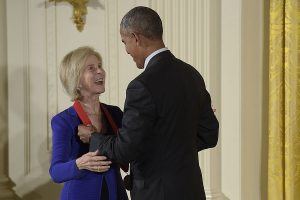Harry Bruinius in The Christian Scence Monitor:
 Elaine Pagels, people say, is a heretic. It’s an ancient accusation, of course, and it hardly wields as much power as it used to, especially in the free-wheeling religious landscape of America. And Ms. Pagels is, in fact, one of the globe’s foremost experts in early Christian heresies. But as a woman who has been disrupting established orthodoxies for nearly half a century, her name still has the power to arouse disdain in certain religious circles. “You know, people have sometimes called me ‘Elaine Pagan’,” the Princeton University professor says during an interview with the Monitor, smiling as she reflects on the trajectory of her life’s work, her many orthodox critics, and her new book, “Why Religion? A Personal Story.” Forty years ago, Pagels’ first book, “The Gnostic Gospels,” was an unlikely sensation. A young historian without tenure and a specialist who read 1st century languages like Coptic, she was one of the first to illuminate an ancient trove of long-lost gospels and other writings about Jesus, writings which were simply stumbled upon by a local farmer near the Egyptian town Nag Hammadi in 1945.
Elaine Pagels, people say, is a heretic. It’s an ancient accusation, of course, and it hardly wields as much power as it used to, especially in the free-wheeling religious landscape of America. And Ms. Pagels is, in fact, one of the globe’s foremost experts in early Christian heresies. But as a woman who has been disrupting established orthodoxies for nearly half a century, her name still has the power to arouse disdain in certain religious circles. “You know, people have sometimes called me ‘Elaine Pagan’,” the Princeton University professor says during an interview with the Monitor, smiling as she reflects on the trajectory of her life’s work, her many orthodox critics, and her new book, “Why Religion? A Personal Story.” Forty years ago, Pagels’ first book, “The Gnostic Gospels,” was an unlikely sensation. A young historian without tenure and a specialist who read 1st century languages like Coptic, she was one of the first to illuminate an ancient trove of long-lost gospels and other writings about Jesus, writings which were simply stumbled upon by a local farmer near the Egyptian town Nag Hammadi in 1945.
…Still, at the heart of “Why Religion?” is a quiet meditation on the meaning of human mortality, and the grief and soul-shattering anguish the famous scholar experienced over the course her life. More than 25 years ago, her firstborn son, then 6, collapsed in her arms and died of a rare respiratory illness. Just a year later, with her two younger children under her care, she lost her husband, who fell to his death while hiking in Colorado. “I needed to write this, partly because I needed to bring forth those experiences that I had buried, because they were so difficult to deal with at the time,” Pagels says of the reasons for writing such an intensely personal book. “And I think for anyone, whether it’s people who write poetry or music or any other kind of expressive forms, you can ask, ‘Why do we really need to do that?’ ”
More here.
